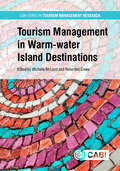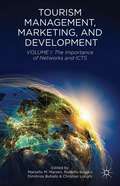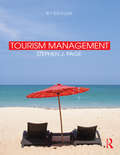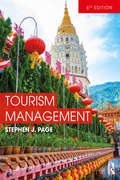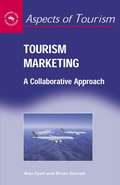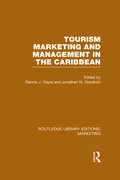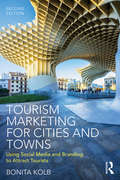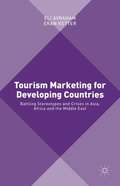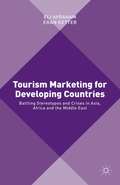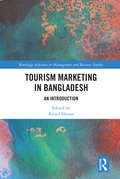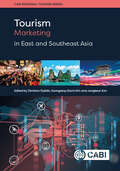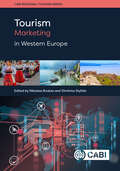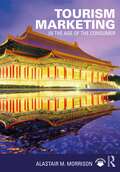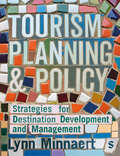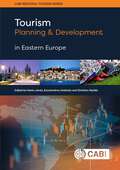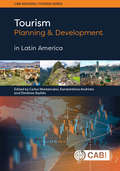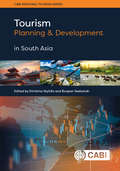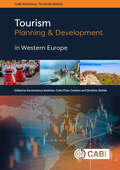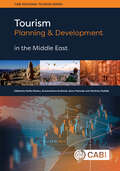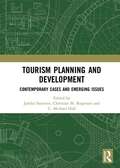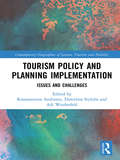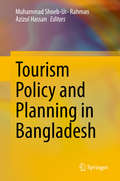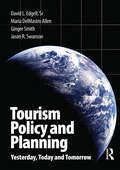- Table View
- List View
Tourism Management in Warm-water Island Destinations (Cabi Series In Tourism Management Research Ser.)
by Frederic Dimanche Michael Sadowski Rachel Dodds Michelle McLeod Robertico Croes David Airey Professor Noel Scott Donna Chambers Dr Sheree-Ann Adams Anne P. Crick Brigitte Joubert Jorge Ridderstaat Manuel Rivera Neelu Seetaram Kelly J. SemradWarm-water islands are a cohesive group of islands distinguished by their geography and remoteness, history as former colonial territories, and dependence on external stakeholders for their economic and social development. Warm-water island destinations also have a year-round tourism industry. These island tourism destinations are facing unprecedented adjustment challenges in the wake of increasing globalization and susceptibility to external shocks, and are in search of appropriate policy responses to that globalization. It is critical for small islands to understand how these challenges affect tourism performance and how they impact their residents. Tourism Management in Warm-water Island Destinations unearths the critical aspects that contribute to tourism development and growth in islands. Particular emphasis is placed on destinations such as the Caribbean, with lessons learned that are applicable to other island tourism contexts in the Mediterranean, Indian Ocean and the Pacific. · Presents emerging research themes and methodology; · Provides insight into factors that result in successful and unsuccessful cases; · Features a focus on Cuba and its reintroduction to the tourism landscape. This book provides a platform for emerging systemic perspectives of the various aspects of island tourism, with the view that strategies for the management and development of tourism in island environments can be improved and will be of interest to those studying and researching within destination management.
Tourism Management, Marketing, and Development
by Dimitrios Buhalis Rodolfo Baggio Marcello M. Mariani Christian LonghiTourism Management, Marketing, and Development revolves around the implementation of ICT applications in the tourism sector: technology is engendering a major shift both in the performance of individuals and companies involved in the tourism sector and having an impact on the way individuals consume services and enjoy experiences in space and time.
Tourism Management: Managing For Change (Tourism And Hospitality Management Ser.)
by Stephen J. PageOne of the leading texts in the field, Tourism Management is the ideal introduction to the fundamentals of tourism as you study for a degree, diploma or single module in the subject. It is written in an engaging style that assumes no prior knowledge of tourism and builds up your understanding as you progress through this wide ranging global review of the principles of managing tourism. It traces the evolution and future development of tourism and the challenges facing tourism managers in this fast growing sector of the world economy. This book is highly illustrated with diagrams and colour images, and contains short case studies of contemporary themes of interest, as well as new data and statistics. This fifth edition has been revised and updated to include: new content on: sports, festivals and event tourism, social media impacts on tourism and the effects of the global economic downturn on tourism, as well as emerging themes in tourism such as slow travel, dark tourism, volunteer tourism and medical tourism updated case studies on BRIC markets and new case studies from the Middle East and Asia enhanced tourism and sustainable development coverage, which runs throughout the book as a major theme, highlighting the challenge of climate change and future tourism growth transport section with more international perspectives from China and South America an updated companion website with: additional case studies, quizzes, PPTs, further reading, web reading and video links, and longer reflective case study per chapter to aid both teaching and learning.
Tourism Management: Managing For Change (Tourism And Hospitality Management Ser.)
by Stephen J. PageOne of the leading texts in the field, Tourism Management is the ideal introduction to the fundamentals of tourism as you study for a degree, diploma or single module in the subject with a global focus. It is written in an engaging style that assumes no prior knowledge of tourism and builds up your understanding as you progress through this wide-ranging global review of the principles of managing tourism. It traces the evolution and future development of tourism and the challenges facing tourism managers in this fast-growing sector of the world economy. This book is highly illustrated with diagrams and colour images, and contains short case studies of contemporary themes of interest, as well as new data, statistics, weblinks to key reports and industry studies. This 6th edition has been revised and updated to include: new content on: sports, festivals and event tourism, including the impact of the Olympic Games, social media impacts on tourism and the growth of medical tourism contemporary issues affecting businesses, such as disruptive technology, the rise of Airbnb, the impact of terrorism on destination instability and safety, and the potential effect of BREXIT updated case studies on BRIC markets and an enhanced focus on Asia as well as emerging markets such as the Middle East and South America enhanced sustainable development coverage highlighting the challenge of climate change and future tourism growth, including new debates such as Last Chance Tourism and overtourism a transport section with more international perspectives from China and South America and globalized transport operators, and a case study on using taxation to limit air travel behaviour an updated companion website with: additional case studies, quizzes, PPTs, further reading, web reading and video links.
Tourism Management: The Socio-Economic and Ecological Perspective
by T. Panda S. MishraTourism management is a compilation of articles by leading tourism experts. The book is an organized presentation of perspectives on tourism management in India.
Tourism Marketing
by Brian Garrod Alan FyallThis book provides a thorough and detailed understanding of tourism marketing principles and practice within the context of inter-organisational collaboration. The book begins with an overview of existing marketing and strategic marketing theory and practice before introducing concepts, theories and issues central to inter-organisational collaboration. The book then concludes with a series of detailed thematic chapters with contemporary tourism marketing case study material which explores the myriad of collaborative marketing strategies undertaken by tourism organisations across the world.
Tourism Marketing and Management in the Caribbean (Routledge Library Editions: Marketing)
by Dennis J. Gayle Jonathan N. GoodrichThe Caribbean now has one of the largest regional tourism industries in the world amongst developing countries. When originally published this volume was the first to provide a comprehensive discussion of tourism in this part of the world. It begins with an overview of the industry and then examines aspect of tourism marketing and management on a region-by-region basis, covering the Bahamas, Jamaica, Barbados, St Lucia, Trinidad and Tobago, Guyana and Cuba. Detailed analysis follows of sectors within the industry, such as heritage and health care, with central issues such as the intense competition between the cruise ship and hotel industries being highlighted. Discussion of the impact of US and EU policies on Caribbean tourism provides an important international perspective. Throughout, the focus is on the contribution of the regional tourism industry to Caribbean economic growth and development.
Tourism Marketing for Cities and Towns: Using Social Media and Branding to Attract Tourists
by Bonita KolbUnderstanding how places, particularly cities and towns, are marketed to and consumed by tourists, is vital to anyone working in the tourism industry. By creating and promoting a unique branded destination, the successful marketer can attract new visitors to their city or tourism attraction. With the rise of social media, there is even more scope to explore how tourism marketers can use their own and other social media sites to communicate with today’s tech connected traveler. In a new updated volume, Tourism Marketing for Cities and Towns provides thorough and succinct coverage of place marketing theory specific to the tourism industry. It focuses on clearly explaining how to develop the branded destination with special emphasis on product analysis, promoting authenticity and, new to this edition, the use of social media to create the personalized experiences desired by visitors. In addition, it contains a wide range of international examples and perspectives from a large variety of different stakeholders, alongside discussion questions and strategic planning worksheets. This book provides both practical advice with real-world application and a theoretical background to the field as a whole. Written in an engaging style, this book will be valuable reading for upper level students and business practitioners of Tourism, Marketing, Urban Studies, Business Management and Leisure Studies.
Tourism Marketing for Developing Countries: Battling Stereotypes and Crises in Asia, Africa and the Middle East
by Eli Avraham Eran KetterTourism Marketing for Developing Countries examines media strategies used by destinations in Asia, the Middle East and Africa to battle stereotypes, negative images and crises in order to attract tourists .
Tourism Marketing for Developing Countries: Battling Stereotypes and Crises in Asia, Africa and the Middle East
by Eli Avraham Eran KetterTourism Marketing for Developing Countries examines media strategies used by destinations in Asia, the Middle East and Africa to battle stereotypes, negative images and crises in order to attract tourists .
Tourism Marketing in Bangladesh: An Introduction (Routledge Advances in Management and Business Studies)
by Azizul HassanTourism is often a key driver of economic growth in many countries. The recent upward trends of tourism and hospitality education in higher academic institutions in Bangladesh suggests a growing tourism sector. Very little has been written on Bangladesh’s tourism industry. This is the first edited volume published from an international publisher which looks at this industry and how it has developed and flourished. The book begins by looking at tourism policy planning and provides a comprehensive overview of topics from tourism products and services in Bangladesh to how they are being marketed. It also discusses how private and public tourism institutions can address future long term trends. This book will appeal to those interested to learn more about developing tourism industry in emerging economies and may provide invaluable lessons from Bangladesh’s experience and success.
Tourism Marketing in East and Southeast Asia (CABI Regional Tourism Series)
by Erdogan Koc Rami K. Isaac Rob Law Catherine Cheung Ja Young Choe Chiara Di Blasio Jia Ying Jiang Hiu Yan Lee Kevin Yin Leung Nguyen Bao Linh Felix Elvis Otoo Fajar Kusnadi Putra Soo Yun Song Paul Strickland Maren ViolDespite the increased research interest in tourism in Asia, most research has focused on the key destinations (China, Macau, Hong Kong, Thailand), while neglecting other destinations which are less well explored. Little is known about the marketing efforts and practices, along with the successes and challenges, countries in the East and Southeast Asia have been experiencing. This book aims to address this oversight by exploring the marketing approaches, techniques and tools used by various countries in the region both collectively and individually to manage their tourism offerings and position them in the global tourism market: China, Hong Kong, Indonesia, Japan, Korea, Macau, Mongolia, Myanmar, Vietnam. It offers a contemporary and insightful look at the various case studies in East and Southeast Asia using inter-disciplinary perspectives and a range of methodological approaches and tools. The book: · Provides case studies developed by tourism researchers who are experts in their researched context countries; · Focuses on several countries at different stage of development; · Explores specific marketing strategies in East and Southeast Asian destinations, considering global trends and forces to fully understand the marketing environment. The book will be of interest to tourism marketing researchers, practitioners, academics, undergraduate and postgraduate students who will find these insightful contemporary case studies useful in the classroom.
Tourism Marketing in Western Europe (CABI Regional Tourism Series)
by Thomas Bausch Eleonora Pantano Carina Ren Dimitrios Stylidis Dr Nikolaos Stylos Dr Konstantinos Andriotis Annarita Sorrentino Jordi Arcos-Pumarola Jesús Barreal Pernas Bernardo Borges Francesco Calza Jacey Choe Marta Conill-Tetuà Elisabeth Cooper Rui Augusto Costa Mengyun Hu Elitza Iordanova Gil Jannes Michele Simoni Mariapina Trunfio Ilma Aulia ZaimTourism is characterized by diversity, enormous growth, and multidimensional impacts on several levels. In the current turbulent environment, tourism destinations need, on the one hand to maintain and enhance their products in the tourism map, and on the other hand, to protect their resources' integrity for future generations, based on sustainability premises. This is more evident for traditional destinations in Western-Europe, as many of them face the consequences of over-growth, unsustainable development, and lack of service quality. In this respect, attention in the literature needs to be given to how destinations in the region can conceptualize and mitigate their weaknesses as well as capitalize on their competences in order to plan, develop and manage tourism products that could lead them to sustainable competitiveness in the long-term. The collection of cases in this book: · Considers global trends and forces in order to understand the marketing environment of a wide number of countries and the appreciation of the sustainable competitive development of destinations. · Explores specific marketing strategies in Western-European countries' destinations. · Is authored by scholars who have performed extensive research on tourism in the countries documented. The book is of significant interest to those researching and working within the area of tourism marketing, but also of interest to students who are seeking wider reading on the topic.
Tourism Marketing: In the Age of the Consumer
by Alastair M. MorrisonTourism Marketing: In the Age of the Consumer offers a fresh and contemporary approach as an introductory textbook on tourism marketing. Six major themes along with the traditional core marketing principles are blended together: Age of the consumer: This book places the customer at the heart of tourism marketing and not the sector’s promotional apparatus. Experiences: It highlights the growing consumer interest in the enjoyment of experiences and experiential marketing. New media: Social media and e-marketing are given emphasis throughout. Coverage of new media is present in all chapters. Global marketplace: Every chapter adopts a global outlook and offers international perspectives. Environment and social responsibility: An emphasis is placed on the sustainability of tourism, including the concepts of ethical tourism and social responsibility. Events: This book treats events as a major tourism marketing topic and integrates events within the concept of experiential marketing. Written in an engaging and accessible style, Tourism Marketing: In the Age of the Consumer is richly illustrated and full of actual case studies and examples looking at a wide variety of topics such as slum tourism, the sharing economy, staycations, event bidding, coping with COVID-19, air travel emissions and many more. Four features add interest and bring greater pedagogical value – Quick Bytes, Case Studies, Industry Voices and Vignettes. This will be essential reading for all tourism marketing students.
Tourism Planning & Policy: Strategies for Destination Development and Management
by Lynn MinnaertLocal, regional and national governments play an important role in how tourism destinations are developed and managed. But where do politics come in? How do organisations like the United Nations fit into this picture? And how does policy making work at the international level? All these questions and more are covered in this essential new textbook, with examples from destinations all over the world. This concise and accessible introduction to tourism planning and policy making explores key themes around the strategic planning process, sustainability, ethics and inclusion in tourism, and future policy directions for tourism. Each chapter includes several snapshots and one case study to demonstrate how theory applies in practice, and ends with self-test questions to check your understanding. This text is essential reading for all college and university students studying tourism, hospitality, events, and leisure and recreation studies. Lynn Minnaert is the Dean of the School of Hospitality at the Metropolitan State University of Denver.
Tourism Planning & Policy: Strategies for Destination Development and Management
by Lynn MinnaertLocal, regional and national governments play an important role in how tourism destinations are developed and managed. But where do politics come in? How do organisations like the United Nations fit into this picture? And how does policy making work at the international level? All these questions and more are covered in this essential new textbook, with examples from destinations all over the world. This concise and accessible introduction to tourism planning and policy making explores key themes around the strategic planning process, sustainability, ethics and inclusion in tourism, and future policy directions for tourism. Each chapter includes several snapshots and one case study to demonstrate how theory applies in practice, and ends with self-test questions to check your understanding. This text is essential reading for all college and university students studying tourism, hospitality, events, and leisure and recreation studies. Lynn Minnaert is the Dean of the School of Hospitality at the Metropolitan State University of Denver.
Tourism Planning and Development in Eastern Europe (CABI Regional Tourism Series)
by Senija Causevic Slawomir Dorocki Cristi Frent Veronika Jánová Olga Junek Halyna Kushniruk Dr Piotr Niewiadomski Lukasz Quirini-Poplawski Mykhailo Rutynskyi Blanka Šimundic Vlatka Škokic Anna Staszewska Svetla Stoyanova-Bozhkova Natalia Tomczewska-Popowycz Peter Vlachos Kejsi Xhafaj Michal ZemlaThree decades ago, the hypermobility of tourists from the days before the global pandemic was truly unthinkable in Eastern Europe. The borders were closed and the region isolated from the rest of the world. Despite an extraordinary transformation of tourism in the area since, Eastern Europe remains under-explored in tourism studies. This book fills the gap by outlining contemporary strategies for tourism development in post-socialist countries, considering the opportunities and challenges as well as the initiatives and approaches to sustainability. Reviewing tourism development and planning across Albania, Bulgaria, Croatia, Czechia, Estonia, Latvia, Poland, Romania and Ukraine, this book: - offers a contemporary insight into Eastern European tourism, with a wide range of case studies from inter-disciplinary and single-disciplinary perspectives; - uses varied methodological approaches and research methods, including in-depth interviews, focus groups, informal conversations, document analysis, netnography, questionnaires and secondary data, to form an interesting and diverse treatise; - considers post-COVID tourism and the significant role of tourism stakeholders in its redevelopment. Illuminating the various economic, socio-cultural and environmental impacts that tourism has created, this book is a valuable reference for researchers and students of tourism and related disciplines, as well as anyone interested in the development of Eastern Europe.
Tourism Planning and Development in Latin America (CABI Regional Tourism Series)
by Dimitrios Stylidis Dr Konstantinos Andriotis Ileana Araúz-Beita Adrián Arias-Navarro Florence E Babb Melvin Bermúdez-Elizondo Carlos Ronald Borbon-Sandí Juan Gabriel Brida Enrique Calfucura Francisca de la Maza Carolina Inés Garcia Carla Guerrón Montero Bibiana Lanzilotta Ledys López Zapata Gabriela Maldonado Pérez Andrea Muñoz-Barriga Gerardo Novo Maribel Osorio-García Fiorella Pizzolon Natalia Porto Martín Rodríguez Brindis Sandra Zapata-AguirreDespite the significance of tourism to the economic, social and environmental structures of Latin America, little has been documented in the English-language literature about tourism in this region. Filling that void, this book focuses exclusively on tourism development and planning, and the impact this has on a wide number of Latin American countries. It covers experiences, challenges, successful and unsuccessful stories, specific cases, and other tourism-related issues, with respect to 10 countries in total. Each chapter is authored by scholars who have done extensive research on tourism in the countries covered. This book: Examines the impact of tourism development and planning within Latin American countries. Takes a multidisciplinary approach including Anthropology, Development, Economics, Ecology, Policy, Sociology and Tourism Planning and Management. Is the first book in English to offer an insight into extensive research undertaken within the region. This book will provide a valuable insight for tourism researchers, practitioners and decision-makers in private and public organisations, not only from the regions of Central, South and North America, but also individuals from other parts of the world who want a more encompassing view of global tourism.
Tourism Planning and Development in South Asia (CABI Regional Tourism Series)
by Dimitrios Stylidis Boopen SeetanahTourism has huge significance as a global economic and social phenomenon, and given the growing reliance on the industry by service-dependent economies around the world, the lack of focus on tourism planning and development in South Asia is surprising. Current issues including social, environmental and cultural aspects underpinned by security challenges have defined the tourism development narratives in many South Asian countries over the last decades and lead to fluid demand and supply patterns. The appetite for and reliance on tourism growth is seen regardless of the numerous challenges faced by the region. Despite a rich and steady history of tourism and demand driven by numerous pull-destinations, most South Asian countries have not invested or benefitted from global tourism growth trends. This book discusses tourism planning and development in South Asian countries and reveals successful and unsuccessful stories by: providing thorough analyses of the nature and focus on tourism development in South Asia; analysing the experiences and challenges addressed via country-focused chapters; identifying the key impacts and current challenges; including cases from Afghanistan, Bangladesh, Bhutan, India, Maldives, Pakistan, Nepal and Sri Lanka. Written by scholars with extensive research experience on tourism in these countries, this book is a much-needed resource and an invaluable reference for researchers, policy makers and other tourism stakeholders involved in tourism planning and development.
Tourism Planning and Development in Western Europe (CABI Regional Tourism Series)
by Martin Fontanari Margarida Ferreira Silva Elisabeth Kastenholz Dr Peter Wiltshier Helena Albuquerque Sonia Ancio-Alcón Ágúst Bogason Rikke Brandt Broegaard Gildas Buron Ana M. Domínguez-Quintero Valeria Fuse Anna Karlsdóttir Marie Louise Mangion Filomena Martins Laura Rauschen Anastasia Traskevich Anna Serena Vergori Valeria DiaferiaFor many decades, Western European countries have undertaken diverse pathways in tourism development and planning. Most have experienced fast or even unlimited growth, resulting in overtourism and, now, the introduction of policies that respect the limits of communities and the sustainability of their resources. Focusing exclusively on tourism development, planning and policy, this book draws together new voices to discuss issues across Belgium, Denmark, Faroe Islands, Finland, France, Germany, Greenland, Iceland, Ireland, Italy, Malta, Norway, Portugal, Spain, Sweden and the UK. It: - Provides both successful and unsuccessful case studies to illuminate real, practical solutions, developed by tourism scholars who are experts in their researched context countries. - Adopts a range of methodological approaches to cover diverse and less-covered areas such as industrial tourism, saltpans, natural and cultural heritage, and micro-destinations. - Considers post-COVID tourism and the significant role of tourism stakeholders in Western Europe's re-development. An invaluable collection for policy-makers, researchers and academics, this book is also an insightful source of engaging contemporary case studies for use in the classroom.
Tourism Planning and Development in the Middle East (CABI Regional Tourism Series)
by Rami K. Isaac Wisam Abbasi Naser Abdi Elad Almog Selenay Ata Nursah Ayhan Fatemeh Bagheri Ashkan Borouj Ali Hajinejad Farid Hanifezadeh Sina Kuzuoglu Sarasadat Makian Alexis Saveriades Ronen Shay Bahram Nekouie Sadry Kholoud Mohamed Maksoud Somayeh ZahabnazouriGiven the historical and cultural richness of countries in the Middle East region, as well as the economic development many have exhibited in recent years, tourism planning and development gains much significance for both scholars and practitioners. Turbulence, conflicts and crises exhibited in the area add further dimensions that need to be incorporated in tourism strategies and planning, and be taken into consideration by experts at an institutional, corporate and educational level. Furthermore, in order to effectively deal with aspects of sustainability, visions and strategies in the region need to build upon good practices. As a result, a greater understanding is required of the factors influencing decision-making on tourism matters as well as on the impacts and implications of sustainable tourism development. This book, written by an international team of experts, addresses the need to examine tourism development and planning in the Middle East from a sustainability perspective by embracing case studies and examples from the region. Through its collection of chapters, the book considers tourism planning and development from the economic, socio-cultural, environmental and regulatory perspectives of sustainability. Thus, the book advances understandings of the positive and negative impacts of tourism development as well as how turbulence, crisis, synergies and the top-down and bottom-up approaches to tourism development are connected to different problems and implications for local communities, the region and the relationship of the Middle East with the rest of the world. An essential resource for tourism practitioners, decision-makers in private and public organisations, government bodies and consultants, not only from the Middle East, but for all those who want an encompassing view of global tourism.
Tourism Planning and Development: Contemporary Cases and Emerging Issues
by Jarkko Saarinen, Christian M. Rogerson and C. Michael HallAcademically complex and challenging to apply, development and planning are increasingly relevant to the growing tourism industry. This collection contains critical studies on tourism development and planning, and calls for proactive, holistic and responsible thinking. It addresses conceptual and contemporary issues in development and planning research including political trust, innovation networks, sustainability, moral encounters, enclavisation and evolutionary economics. It argues that recognition of the contextual and historical dimensions around tourism development and planning is essential to help both researchers and practitioners better understand destination and place-based decision-making. In addition, it will lead to improvements in stakeholder relations, and explains how tourism best works with localities and localities with tourism. This book was originally published as a special issue of Tourism Geographies.
Tourism Policy and Planning Implementation: Issues and Challenges (Contemporary Geographies of Leisure, Tourism and Mobility)
by Konstantinos Andriotis Adi Weidenfeld Dimitrios StylidisPolicy and planning are particularly important in tourism due to their multi-faceted nature and the complexity of inter-organisational relations and collaboration. This book sheds light onto these interrelations through the critical review of tourism planning policies and their measurable outcomes. Looking at a range of policies in a variety of countries at both micro and macro levels, it considers both the failures and successes of implementing tourism policies and planning initiatives. Policies discussed throughout include: cross-border tourism, planning in post-conflict destinations and sustainable tourism development. This multidisciplinary volume furthers knowledge of the impacts of planning and policy implementation on tourism development both present and future. Written by an international team of highly esteemed academics from some of the world’s leading institutions, this will be a valuable resource for students and researchers in tourism, sociology, geography, development studies, politics, economics, and management.
Tourism Policy and Planning in Bangladesh
by Azizul Hassan Muhammad Shoeb-Ur- RahmanThis book accounts that Bangladesh is a potential destination in South Asia exhibiting a steady growth in its economy along with socio-cultural developments. With a population of over 170 million, the country possesses significant possibilities in (domestic) tourism. This book explicates that increasing number of upper social classes along with their affordability to spend on tourism and leisure activities has recalled attention for the development of this emerging industry. This book comprehensively examines the overall tourism and hospitality contexts in Bangladesh under the lens of current policy and administrative frameworks. In so doing, the contribution of tourism and hospitality industry has been highlighted in the economy of Bangladesh as a means to creating employment opportunities. Further, the book addresses that contributions remain uneven and distributed improperly and to date the tourism industry has not been offered the desired attention in supporting examples in this regard. Nonetheless, tourism and hospitality education and research have been intensifying in recent years across numerous higher academic institutions (e.g. public and private universities) in Bangladesh. This book explores critically the requirement of supportive roles of key tourism and hospitality stakeholders both from public and private domains. Ultimately, the book signifies collaborative and continuous efforts are imperative that partake both the practitioners and the academia in the development and execution of inclusive and functional tourism policy and planning in Bangladesh.
Tourism Policy and Planning: Yesterday, Today, And Tomorrow
by Jason Swanson Ginger Smith Maria Delmastro Allen David Edgell Sr.For many communities and countries throughout the world tourism is the most valuable industry. Economic changes taking place in China, India, and the United States (with almost 3 billion people, half the world's population), for example, will have major impacts on the global tourism markets of tomorrow. Social-cultural changes in Europe, with borderless tourism crossings and a common currency, are increasing opportunities for tourism growth. East Asia and the Pacific Rim are experiencing unprecedented growth and change in tourism. From the perspective of economic policy, tourism for local communities is a vital economic development tool producing income, creating jobs, spawning new businesses, spurring economic development, promoting economic diversification, developing new products, and contributing to economic integration. If local and national governments are committed to broad based tourism policies, then tourism will provide its citizens with a higher quality of life while it generates sustained economic, environmental, and social benefits. The wellspring to future growth for tourism throughout the world is a commitment toward good policy. Governments, the private sector, and not-for-profit agencies must be the leaders in a sustainable tourism policy that transcends the economic benefits and embraces environmental and cultural interests as well. Tourism Policy and Planning: Yesterday, Today, and Tomorrow addresses key ingredients for positive tourism policies and planning that will lead this generation and the next toward a greater quality of life resulting from tourism growth. The aim of this book is to provide government policy-makers (at all levels), business leaders, not-for-profit executives, university professors, students, tourism industry managers, and the general public with an introduction and examination of important policy and planning issues in tourism.
